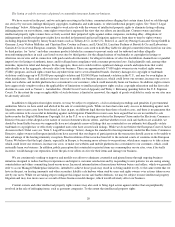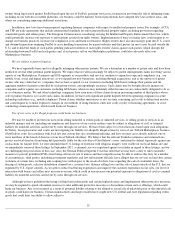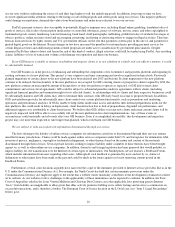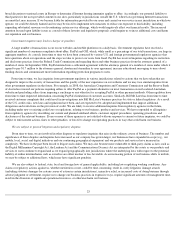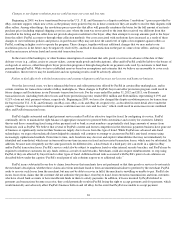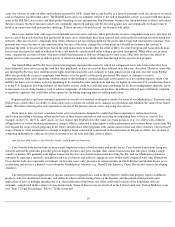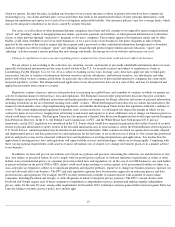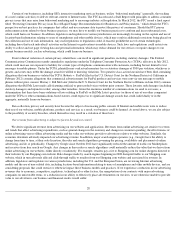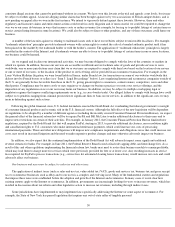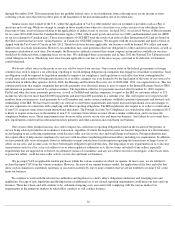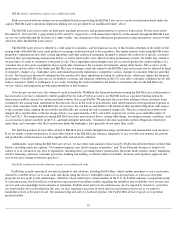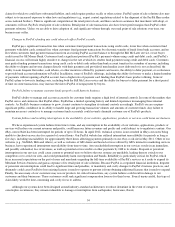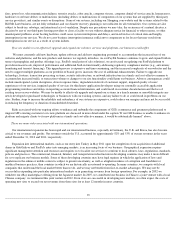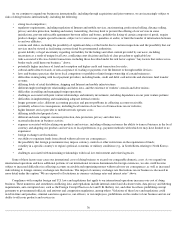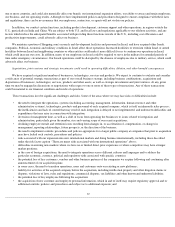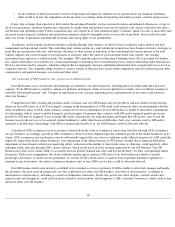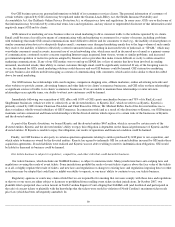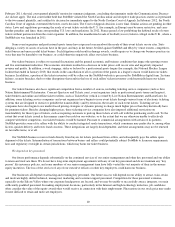eBay 2012 Annual Report Download - page 32
Download and view the complete annual report
Please find page 32 of the 2012 eBay annual report below. You can navigate through the pages in the report by either clicking on the pages listed below, or by using the keyword search tool below to find specific information within the annual report.
constitute illegal auctions that cannot be performed without its consent. We have won this lawsuit at the trial and appeals court levels, but it may
be subject to further appeal. A lawsuit alleging similar claims has been brought against us by two associations of French antique dealers, and is
now pending on appeal after we won in the first instance. We intend to vigorously defend against these lawsuits. However, these and other
regulatory and licensure claims and enforcement actions could result in costly litigation and, if unsuccessful, we could be required to change the
way we or our users do business in ways that increase costs or reduce revenues (for example, by forcing us to prohibit listings of certain items or
restrict certain listing formats in some locations). We could also be subject to fines or other penalties, and any of these outcomes could harm our
business.
A number of the lawsuits against us relating to trademark issues seek to have our websites subject to unfavorable local laws. For example,
“trademark exhaustion” principles provide trademark owners with certain rights to control the sale of a branded authentic product until it has
been placed on the market by the trademark holder or with the holder's consent. The application of “trademark exhaustion” principles is largely
unsettled in the context of the Internet, and if trademark owners are able to force us to prohibit listings of certain items in one or more locations,
our business could be harmed.
As we expand and localize our international activities, we may become obligated to comply with the laws of the countries or markets in
which we operate. In addition, because our services are accessible worldwide and we facilitate sales of goods and provide services to users
worldwide, one or more jurisdictions may claim that we or our users are required to comply with their laws based on the location of our servers
or one or more of our users, or the location of the product or service being sold or provided in an ecommerce transaction. For example, in the
Louis Vuitton Malletier litigation, we were found liable in France, under French law, for transactions on some of our websites worldwide that
did not involve French buyers or sellers (see “Item 3: Legal Proceedings”
below). Laws regulating Internet and ecommerce companies outside of
the U.S. are generally be less favorable than those in the U.S., giving greater rights to consumers, content owners, competitors, users and other
third parties. Compliance may be more costly or may require us to change our business practices or restrict our service offerings, and the
imposition of any regulations on us or our users may harm our business. In addition, we may be subject to multiple overlapping legal or
regulatory regimes that impose conflicting requirements on us (e.g., in cross-
border trade). Our alleged failure to comply with foreign laws could
subject us to penalties ranging from criminal prosecution to significant fines to bans on our services, in addition to the significant costs we may
incur in defending against such actions.
Following the global financial crisis, U.S. federal lawmakers enacted the Dodd-Frank Act overhauling the federal government's oversight
of consumer financial products and systemic risk in the U.S. financial system. Although the full effect of the new legislation will be dependent
on regulations to be adopted by a number of different agencies (including the recently created Consumer Financial Protection Bureau), we expect
the general effect of the financial reform law will be to require PayPal and Bill Me Later to make additional disclosures to their users and to
impose new restrictions on certain of their activities. For example, in January 2012, the Consumer Financial Protection Bureau finalized new
regulations, required by the Dodd-Frank Act that will require PayPal, starting in 2013, to provide additional disclosures, error resolution rights
and cancellation rights to U.S. consumers who make international remittance payments, which could increase our costs of processing
international payments. These and other new obligations will impose new compliance requirements and obligations on us that could increase our
costs, may result in increased litigation and the need to make expensive product changes and may otherwise adversely impact our business.
In addition, we also expect that the continued implementation of the Dodd-Frank Act will adversely impact some significant traditional
revenue streams for banks. For example, in June 2011, the Federal Reserve Board issued a final rule capping debit card interchange fees. As a
result of this and other regulations implementing the financial reform law, banks may need to revise their business models to remain profitable,
which may lead them to charge more for services which were previously provided for free or at lower cost. Any resulting increases in service
fees required for PayPal to process transactions (e.g., service fees for automated clearing house transactions) would increase our costs and could
adversely affect our business.
Our business and users may be subject to sales tax and other taxes.
The application of indirect taxes (such as sales and use tax, value-added tax (VAT), goods and services tax, business tax and gross receipt
tax) to ecommerce businesses such as eBay and to our users is a complex and evolving issue. Many of the fundamental statutes and regulations
that impose these taxes were established before the adoption and growth of the Internet and ecommerce. In many cases, it is not clear how
existing statutes apply to the Internet or ecommerce. In addition, governments are increasingly looking for ways to increase revenues, which has
resulted in discussions about tax reform and other legislative action to increase tax revenues, including through indirect taxes.
Some jurisdictions have implemented or may implement laws specifically addressing the Internet or some aspect of ecommerce. For
example, the State of New York has passed legislation that requires any out-of-state seller of tangible personal
30


